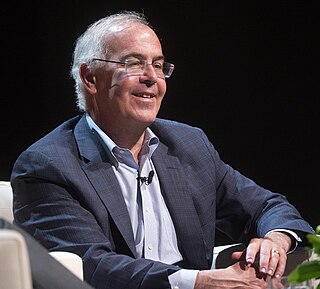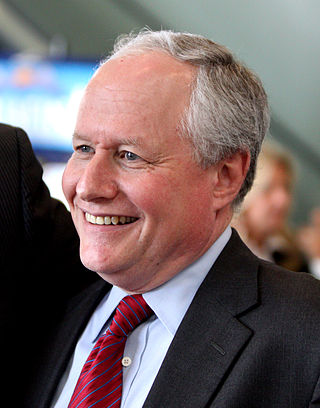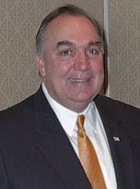Related Research Articles

William Jefferson Clinton is an American politician who served as the 42nd president of the United States from 1993 to 2001. A member of the Democratic Party, he previously served as governor of Arkansas from 1979 to 1981 and again from 1983 to 1992. Clinton, whose policies reflected a centrist "Third Way" political philosophy, became known as a New Democrat. He is the husband of Hillary Clinton, who was a U.S. senator from New York from 2001 to 2009, secretary of state from 2009 to 2013 and the Democratic nominee for president in 2016.

Keith Rupert Murdoch is an Australian-born American business magnate, media proprietor, and investor. Through his company News Corp, he is the owner of hundreds of local, national, and international publishing outlets around the world, including in the UK, in Australia, in the US, book publisher HarperCollins, and the television broadcasting channels Sky News Australia and Fox News. He was also the owner of Sky, 21st Century Fox, and the now-defunct News of the World. With a net worth of US$21.7 billion as of 2 March 2022, Murdoch is the 31st richest person in the United States and the 71st richest in the world according to Forbes magazine.

The Washington Times is an American conservative daily newspaper published in Washington, D.C., that covers general interest topics with a particular emphasis on national politics. Its broadsheet daily edition is distributed throughout Washington, D.C. and in parts of suburban Maryland and Northern Virginia. A weekly tabloid edition aimed at a national audience is also published. The Washington Times was one of the first American broadsheets to publish its front page in full color.

The 1996 United States presidential election was the 53rd quadrennial presidential election, held on Tuesday, November 5, 1996. Incumbent Democratic President Bill Clinton defeated former Senate Majority Leader Bob Dole, the Republican nominee, and Ross Perot, the Reform Party nominee and 1992 Independent presidential candidate.

The 1992 United States presidential election was the 52nd quadrennial presidential election, held on Tuesday, November 3, 1992. Democratic Governor Bill Clinton of Arkansas defeated incumbent Republican President George H. W. Bush and independent businessman Ross Perot of Texas. The election marked the end of a period of Republican dominance in American presidential politics that began in 1968, and also marked the end of 12 years of Republican rule of the White House, as well as the end of the Greatest Generation's 32-year American rule and the beginning of the baby boomers' 28-year dominance until 2020. It was the last time the incumbent president failed to win a second term until 2020, when Donald Trump lost the election to Joe Biden; it was the first such occurrence since 1980.

David Brooks is an American moderate conservative political and cultural commentator who writes for The New York Times. He has worked as a film critic for The Washington Times, a reporter and later op-ed editor for The Wall Street Journal, a senior editor at The Weekly Standard from its inception, a contributing editor at Newsweek, and The Atlantic Monthly, in addition to working as a commentator on NPR and the PBS NewsHour.

David Jeffrey Frum is a Canadian-American political commentator and a former speechwriter for President George W. Bush. He is currently a senior editor at The Atlantic as well as an MSNBC contributor. In 2003, Frum authored the first book about Bush's presidency written by a former member of the administration. He has taken credit for the famous phrase "axis of evil" in Bush's 2002 State of the Union address.

William Kristol is an American neoconservative writer. A frequent commentator on several networks including CNN, he was the founder and editor-at-large of the political magazine The Weekly Standard. Kristol is now editor-at-large of the center-right publication The Bulwark.

The Weekly Standard was an American neoconservative political magazine of news, analysis, and commentary that was published 48 times per year. Originally edited by founders Bill Kristol and Fred Barnes, the Standard was described as a "redoubt of neoconservatism" and as "the neocon bible." Its founding publisher, News Corporation, debuted the title on September 18, 1995. In 2009, News Corporation sold the magazine to a subsidiary of the Anschutz Corporation. On December 14, 2018, its owners announced that the magazine would cease publication, with the last issue to be published on December 17. Sources have attributed its demise to an increasing divergence between Kristol and other editors' shift towards anti-Trump positions on the one hand, and the magazine's audience's shift towards Trumpism on the other.
David Brock is an American liberal political consultant, author, and commentator who founded the media watchdog group Media Matters for America. He has been described by Time as "one of the most influential operatives in the Democratic Party".
The Log Cabin Republicans (LCR) is an organization affiliated with the Republican Party which advocates for equal rights for LGBT+ Americans.
In politics, opposition research is the practice of collecting information on a political opponent or other adversary that can be used to discredit or otherwise weaken them. The information can include biographical, legal, criminal, medical, educational, or financial history or activities, as well as prior media coverage, or the voting record of a politician. Opposition research can also entail using "trackers" to follow an individual and record their activities or political speeches.

The 1994 United States House of Representatives elections were held on November 8, 1994, to elect U.S. Representatives to serve in the 104th United States Congress. They occurred in the middle of President Bill Clinton's first term. In what was known as the Republican Revolution, a 54-seat swing in membership from the Democratic Party to the Republican Party resulted in the latter gaining a majority of seats in the House of Representatives for the first time since 1952. It was also the largest seat gain for the party since 1946, and the largest for either party since 1948, and characterized a political realignment in American politics.
Matthew Joseph Continetti is an American journalist and a senior fellow in Social, Cultural, and Constitutional Studies at the American Enterprise Institute.
The Opposition Research Group refers to the division within the Republican National Committee formed in 1984 with its own budget of $1.1 million, to create a master data bank of computerized voter research and opposition research. These staff amassed information on eight Democratic presidential candidates based on data from voting records, Congressional Record speeches, media clippings and transcripts, campaign materials, all of which was stored on a computer for easy access. In this way the party was able to track inconsistencies of its opponents and attack them. This original data base evolved into a network that linked information gleaned by Republicans in all 50 states, creating a master data base accessible to high-ranking Republican staff, even aboard Air Force One when Ronald Reagan was president.
President Bill Clinton made two appointments to the Supreme Court of the United States, both during his first term.

The 1990 Michigan gubernatorial election was held on November 6, 1990, to elect the Governor and Lieutenant Governor of the state of Michigan. John Engler, a member of the Republican Party and State Senate majority leader, was elected over Democratic Party nominee, incumbent governor James Blanchard, who was seeking his third term.

The 1996 presidential campaign of Bob Dole began when Republican Senator and Senate Majority Leader Bob Dole formally announced his candidacy for Republican Party nomination in 1995. After beating other candidates in the primaries, he became the Republican nominee, with his opponent being Democratic incumbent President Bill Clinton in the 1996 presidential election. Dole conceded defeat in the race in a telephone call to Clinton on November 5, 1996.
Lorraine Ann Voles is an American political advisor who has served as chief of staff to the vice president of the United States since 2022.
The 1992 presidential campaign of Tom Harkin, a U.S. Senator from Iowa, began with a campaign rally on September 15, 1991. Harkin had first been elected to a national office in 1974 as a member of the House of Representatives, serving from 1975 to 1985, when he became a senator. A member of the Democratic Party, Harkin established himself as a populist liberal, supporting New Deal-style policies while receiving broad support from organized labor and left-leaning voters. Harkin was very critical of then-President George H. W. Bush, a conservative Republican, and positioned himself as the most liberal candidate in the Democratic field. His policy positions included support for a national health insurance system, cuts to military funding, and increased funding for infrastructure.
References
- ↑ Richard L. Berke, "Murdoch Finances New Forum for Right," New York Times, April 30, 1995.
- ↑ Richard L. Berke, "Campaign '92: Live, in Color, and Bare-Knuckled," New York Times, June 25, 1992.
- ↑ Richard L. Berke, "Centrists Are Wary of Clinton Tilting," New York Times, Dec. 3, 1993.
- ↑ "Richard L. Berke, "Murdoch Finances..." NYTimes, April 30, 1995.
- ↑ "David Tell, opinion editor". The Weekly Standard . Archived from the original on 2001-10-05. Retrieved 2006-12-03.